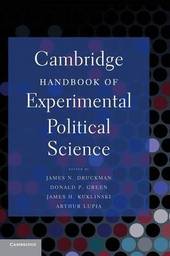
|
Cambridge Handbook of Experimental Political Science
Hardback
Main Details
| Title |
Cambridge Handbook of Experimental Political Science
|
| Authors and Contributors |
Edited by James N. Druckman
|
|
Edited by Donald P. Greene
|
|
Edited by James H. Kuklinski
|
|
Edited by Arthur Lupia
|
| Physical Properties |
| Format:Hardback | | Pages:578 | | Dimensions(mm): Height 254,Width 178 |
|
| ISBN/Barcode |
9780521192125
|
| Classifications | Dewey:320.072 |
|---|
| Audience | | Professional & Vocational | |
|---|
| Illustrations |
12 Tables, unspecified; 14 Halftones, unspecified; 22 Line drawings, unspecified
|
|
Publishing Details |
| Publisher |
Cambridge University Press
|
| Imprint |
Cambridge University Press
|
| Publication Date |
6 June 2011 |
| Publication Country |
United Kingdom
|
Description
Laboratory experiments, survey experiments and field experiments occupy a central and growing place in the discipline of political science. The Cambridge Handbook of Experimental Political Science is the first text to provide a comprehensive overview of how experimental research is transforming the field. Some chapters explain and define core concepts in experimental design and analysis. Other chapters provide an intellectual history of the experimental movement. Throughout the book, leading scholars review groundbreaking research and explain, in personal terms, the growing influence of experimental political science. The Cambridge Handbook of Experimental Political Science provides a collection of insights that can be found nowhere else. Its topics are of interest not just to researchers who are conducting experiments today, but also to researchers who think that experiments can help them make new and important discoveries in political science and beyond.
Author Biography
James N. Druckman is Payson S. Wild Professor of Political Science at Northwestern University. He has published articles in journals such as the American Political Science Review, the American Journal of Political Science and the Journal of Politics. He currently is the editor of Public Opinion Quarterly. Professor Druckman's research focuses on political preference formation and communication, and his recent work examines how citizens make political, economic and social decisions in various contexts. Donald P. Green is A. Whitney Griswold Professor of Political Science at Yale University. He is the author of four books and several dozen articles on a wide array of topics, including partisanship, campaign finance, voting and prejudice. Since 1998, his work has focused on the design, implementation and analysis of field experiments. James H. Kuklinski is Matthew T. McClure Professor of Political Science at the University of Illinois, Urbana-Champaign. His interests include citizen decision-making and the formulation of experimental designs that generate more accurate inferences about the external world than the traditional random assignment experiment. Arthur Lupia is Hal R. Varian Professor of Political Science at the University of Michigan. He studies politics with a focus on how people make decisions when they lack information. Professor Lupia co-founded TESS (Time-Sharing Experiments for the Social Sciences) and served as Principal Investigator of the American National Election Studies.
Reviews'This handbook is a monumental undertaking. It contains something of value for political scientists of every methodological and substantive stripe.' Morris P. Fiorina, Stanford University 'Once rare outside the psychological laboratory, experimental methods are now used throughout the social sciences. Focusing on experimentation in political science, this handbook provides a state-of-the-art review of the history, logic, and methodology of experimentation, including the implementation of experiments in representative surveys. Comprehensive reviews of what has been learned from experiments in areas as diverse as voter behavior, institutions, identity, and elite bargaining highlight the substantive contributions of experimental research to social science theory testing and development. Written by leading experts in the field, this handbook will be a valuable and authoritative resource for years to come.' Norbert Schwarz, University of Michigan 'This handbook is a long overdue contribution to a burgeoning area in political science. It will be extremely useful to any political scientist contemplating or currently using experimental methods.' Diana C. Mutz, University of Pennsylvania 'In the Cambridge Handbook of Experimental Political Science, Druckman, Green, Kuklinski, and Lupia put together thirty-six contributed chapters covering the design, scope, and methods of experimental political science. They have taken on the core issues, such as the trade-offs between internal and external validity. They explore the value of laboratory versus field versus survey experiments. The chapters here show how political science draws from other experimental fields, creating its own broadly unique approach to experimentation. The authors of the chapters here explore the ways in which experiments drawn from the traditions of cognitive science, psychology, and economics take some things for granted and how experiments in each of these traditions assume different things to be consequential. This book should be used in every first-year graduate curriculum, not just as a book on experiments, but as an excellent primer on research design.' Mathew D. McCubbins, University of Southern California
|